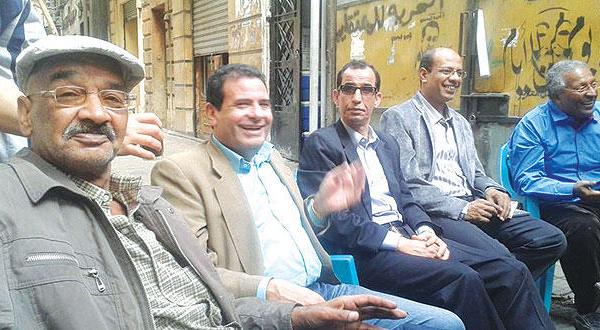Cairo, Asharq Al-Awsat—Egyptian poet Ahmed Abdel Muti Hijazi famously wrote a divisive article in the monthly Ibdaa Arabic literary magazine, of which he is the editor-in-chief, claiming that the publication was exclusively for the literati, not the “harafish” (ordinary people). Will this sentiment once again return to Egyptian cultural life, albeit in a new form?
A number of poets and intellectuals, that include Hijazi himself, have initiated a new cultural forum in Cairo’s famous Café Riche in a bid to revive Nobel Prize winning writer Naguib Mahfouz’s renowned literary salons, held at the same venue during the 1960s and 1970s.
The new gathering is set to take place on the first Friday of the month with discussion topics selected during the preceding month.
It is expected that the forum will be attended predominantly by the literati crowd. It does, however, coincide with a weekly gathering held at Zahrat Al-Bustan Café led by novelist Wahid Al-Tawila and attended by people of all backgrounds, called the Friday Session. Many high profile writers, artists and poets also regularly attend this event, including Abdul-Monem Ramadan, Saed Al-Kafrawi, Ezzat el Kamhawi, Sabir Rusdhi, Abdulaziz Jamaluddin, Mohamed Ablah, Mujahed Al-Azab, Girgis Shukri and Mohamed Al-Wardani.
As a result of Café Riche’s souring prices in recent years, intellectuals trying to replicate its old literary salons have grown accustomed to frequenting the nearby, and cheaper, Zahrat Al-Bustan Café. The open-air café has subsequently overtaken Café Riche as a forum for writers to hold discussions and book signings, becoming a popular haunt for artists and intellectuals.
Zahrat Al-Bustan Café was originally a small shop and was bought by owner Haj Abdullatif in the 1960s to replace his drinks stall. The new café soon attracted a large number of intellectuals, writers and poets including Yousef Idris, Muhammad Afifi Matar and Yahya Taher Abdullah.
Despite the distinguished tradition and popularity of the two cafes with the Cairene intellectual crowd, it is likely that Café Riche’s forum will ultimately be less popular due to the reputation of its chief organizer. A renowned writer who regularly visits Zahrat al-Bustan Café told Asharq Al-Awsat that Hijazi has a reputation for arrogance in cultural and intellectual issues.
And then there is that infamous article Hijazi wrote. The article was met with outright hostility, and a number of poets and writers declared a boycott of the magazine under Hijazi’s chairmanship. They emphasized their abhorrence of the “elite” concept, and said it was “based on a political idea they firmly reject.”
As Café Riche’s first cultural forum passed almost unnoticed, the neighboring Friday Session was full of lively intellectual debate about present day cultural issues. The session was attended by Ra’ouf Mus’ad, an Egyptian novelist living in the Netherlands, who was visting Cairo. Its regulars took the opportunity to chat with the writer about his latest work while sipping tea amid clouds of shisha smoke.
Speaking to Asharq Al-Awsat, poet, author and founder of the Friday Session, Al-Tawila said: “It is such a wonderful gathering that has become a cultural ceremony which I, as well many writers, poets and artists, feel keen to attend to the extent that even my body is troubled if I missed a session for any reason.”
When asked about his feelings towards the new forum at the neighboring Café Riche, he answered quickly “It is a wonderful idea which I wish will continue and expand. There would be no problem at all if they wanted to visit us.”
He added, “The Egyptian cultural scene has been worn down and does not stand for rancor, spite, or small fights anymore. There is no time for the classification of ‘elites’ or ‘harafish’ or pro-government writers or any others. Egyptian culture requires a truthful and realistic reconciliation in order to once again become a strong argumentative body with a recognized role in serving society.”

